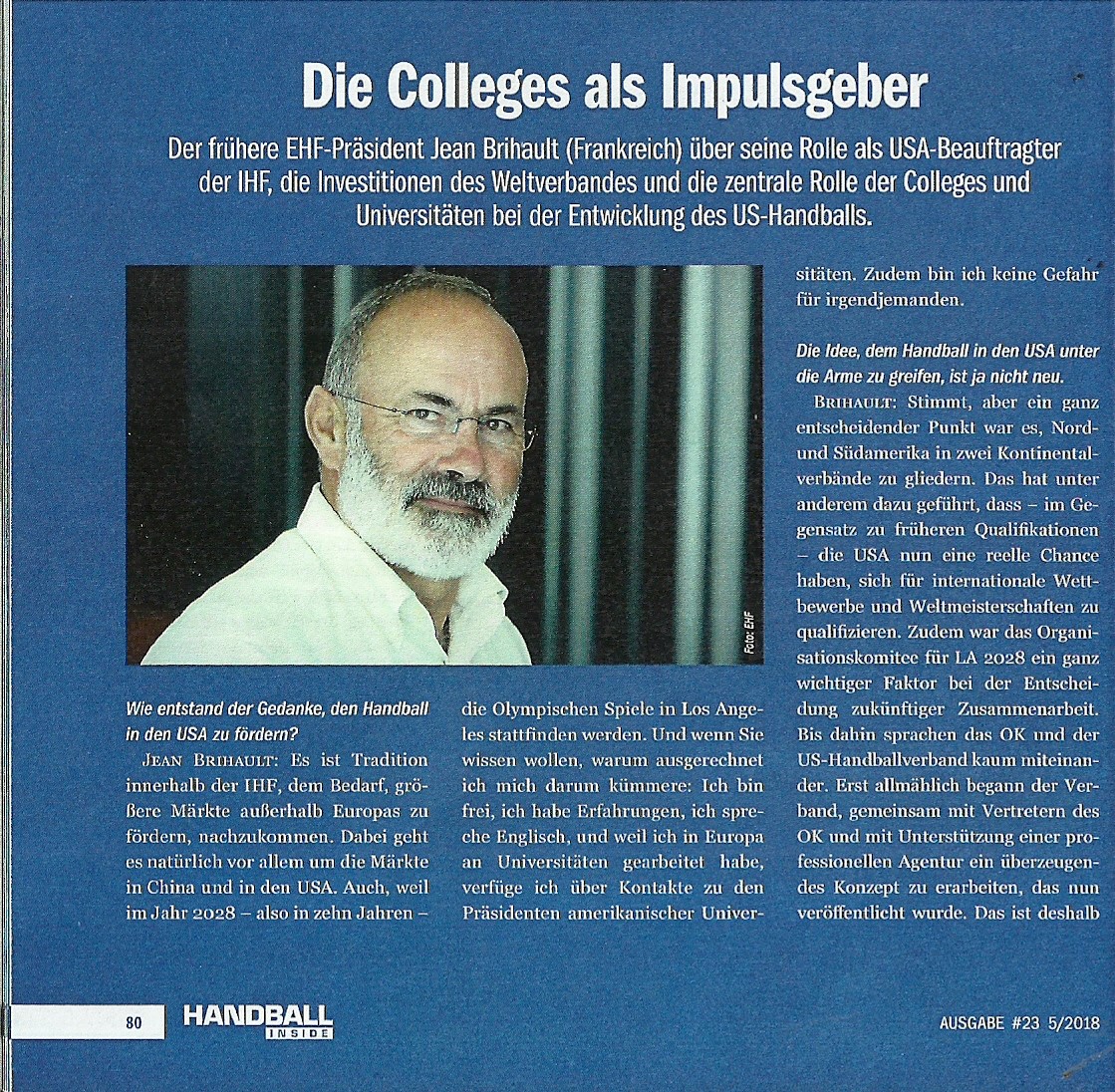
Jean Brihault, the IHF’s point man for handball development in the U.S.
Colleges as a Jump Starter
The former EHF president, Jean Brihault (France), about his role as USA delegate for the IHF, the investments of the World Handball Federation and the central role of colleges and universities for the development of U.S. Handball.
How did the thought come about to foster Handball in the US?
JEAN BRIHAUT: It is an IHF tradition to meet the need to promote larger markets outside Europe. This is mainly about the markets in China and in the USA. Also, because in 2028 – ten years from now – the Olympic Games will take place in Los Angeles. And, if you want to know why I am in charge of it?: I am free, I have experience, I speak English, and because I have worked at universities in Europe, I have contacts with the presidents of American universities. Besides, I’m not a danger to anyone.
The idea of helping handball in the US is not new.
BRIHAULT: That’s right, but one crucial point was to split North and South America into two continental federations. This means, among other things, that – unlike previous qualifications – the U.S. now has a realistic chance to qualify for international competitions and world championships. In addition, the Organizing Committee for LA 2028 was a very important factor in deciding future cooperation. Until then, the United States Olympic Committee (USOC) and the US Handball Association hardly talked to each other. Only gradually did the association, together with representatives of the USOC and with the support of a professional agency, come up with a convincing concept which has now been published. That is important because the USOC allocates funds to each of the national sports associations, and now Handball can receive support in the form of money, time and expertise.
And has the situation for the association improved a little?
BRIHAULT: As Dr. Hassan Moustafa and I were in the States in March, we met representatives of a foundation that immediately provided the Handball association with three fully furnished offices and a meeting room. This is now the new home of the US Handball Federation and the North American Association. There is enough space for both. That way you can utilize synergy effects and save a lot of money. The first six months are completely rent-free and after that the US federation only has to pay for electricity and heating.
That’s nice, but not that much. How does the IHF help?
BRIHAULT: The IHF is currently investing in a – let’s call it – a Development Manager, primarily responsible for finding sponsors for the US association. The IHF pays him, but that can be confidently called an investment, as we firmly believe it will make a profit. In addition, the USOC will pay for a Technical Director who is in charge of development, training and education programs. You should know that the whole project is based on three pillars: high level performance, fundamentals and visibility.
This means?
BRIHAULT: For the performance, the association has hired Robert Hedin formerly coach of the Norwegian national team for the men. For the women, there is an agreement with the French federation that the U.S. team can partake in one of their leagues on a non-competitive basis. We are thinking about a start in the 3rd league for the season 2020/21. In terms of visibility, I met with a manager from NBC to get handball on TV. This is difficult because we do not have to address the classic Handball audience. Thus, broadcasts of complete games are of little use. Instead, we want to show sequences that will make our sport attractive to people in the US. And, where contacts are concerned, we will try, among other things, to bring protagonists on board who are well-known in Europe and are in charge of the U.S. market. Hans Vestberg, President of the Swedish Federation, is involved as is Xavier 0 ‘Callaghan, who is part of the management of FC Barcelona for the U.S.
How many players are we talking, when talking about Handball in the US?
BRIHAULT: That’s hard to say. That’s why I met with leaders of different colleges because they have to be involved if we want to give Handball a broad base. From there, the impetus has to start to make Handball popular.
And this project spans for the next ten years – so up to the Olympic Games in Los Angeles?
BRIHAULT: It should run as long as possible. Part of this project will be to give the U.S. teams a wild card for the 2025 and 2027 World Cups so they can play handball at the absolute world level. I remember the people in Atlanta in 1996 were thrilled. More than 30,000 spectators attended the final. That is fantastic.
Interview by Arnulf Beckmann
Translation courtesy of Christa Ingram